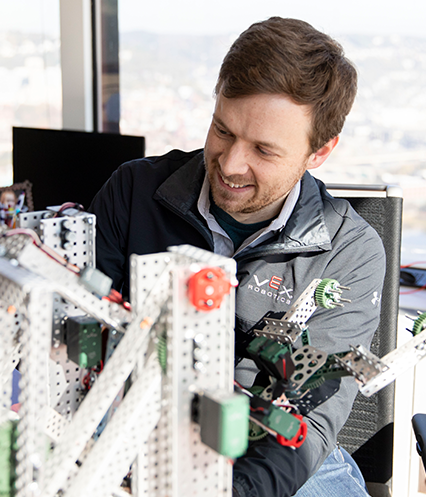
"Software engineering is not just creating the software, it’s thinking about how it’s designed and how users will use it."
Tim Friez ‘08 still remembers his family’s first computer. He was in third grade, and his dad — a butcher by trade — was working toward an IT degree. As his father began tinkering with the machine, Friez started tinkering too.
Before long he was interested in robotics, and now he has turned his former hobby into a successful career. Friez is the chief operating officer of Robomatter, a Pittsburgh company that develops education software for classrooms around the world. Friez built his first robot as part of a technology program at Schenley High School in Pittsburgh, and cites that as the inspiration for everything that’s happened since. “The robot basically had to run around a table and pick up ping pong balls and deliver them into a goal,” he says. “I’d always enjoyed little remote control cars, but then I was like, ‘Wow, I can put a computer inside my remote control car. This is awesome!’”
It’s an aha moment that Friez’s company seeks to inspire in other students. Combining robotics and computer science, Robomatter creates hands-on experiences to illustrate abstract math and science concepts.
“In middle school, students will learn about the idea of circles and the circumference of a circle, and they’ll think ‘What am I ever going to do with that?’” Friez says. “We can take a circle and put it on a robot — which would be a wheel — then we tell that robot to travel for two wheel rotations, and the distance it travels is two times the circumference.”
Friez decided to pursue a software engineering degree at RMU after being awarded a Presidential Scholarship, which covers full tuition for four years. But it was more than the financial assistance that convinced him Robert Morris was a great fit. “I wanted a smaller school experience. I didn’t want to be in 200-person classes,” he says.
While at RMU, Friez secured an internship doing research and development at the Carnegie Mellon University National Robotics Engineering Center. During his sophomore year, he and four research colleagues founded Robomatter as a way to bring their work to the education marketplace. Friez then spent the next decade developing software and ROBOTC, a programming language for schools, and taking the project on the road to conferences and demos.
The company grew, and Friez became COO in 2016, when Robomatter was acquired by Texas-based Innovation First International. He oversees the company’s day-to-operations from its 35th floor headquarters at K&L Gates Center, where about 25 employees go to work each day in what the Pittsburgh Business Times has called one of the city’s “coolest” offices.
Reflecting on his education at Robert Morris, Friez credits both the faculty and the school’s institutional emphasis on communication skills. He names Sushil Acharya as a particularly influential software engineering professor.
“He was able to instill the thought processes that go into making successful software applications,” says Friez. “Software engineering is not just creating the software, it’s thinking about how it’s designed and how users will use it.”
Just as importantly, Friez learned that being a brilliant designer or developer takes you only so far. “The writing courses and the public speaking classes were immensely useful, because they forced you to break out of the shell,” he says. “The stereotype of the awkward programmer in the corner who just sits there and writes code all day — that’s a fallacy. You have to go out and sell your ideas.”
Now a little more than a decade after graduating, Friez is looking for ways to give back to his alma mater. Robomatter has begun working with the School of Engineering, Mathematics and Science to create an internship pipeline to the company. Friez has joined the school’s board of visitors and is looking at ways to raise the engineering program’s profile with robotics competitions and workshops on campus.
